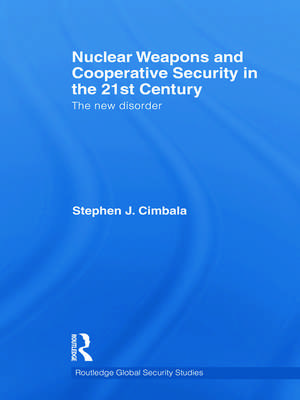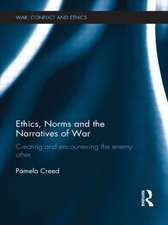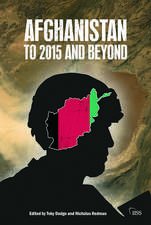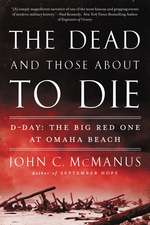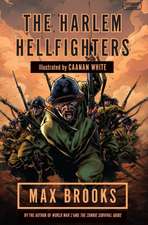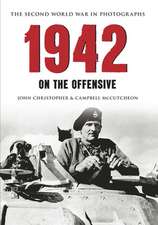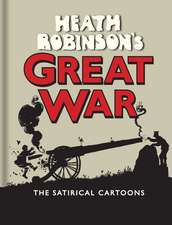Nuclear Weapons and Cooperative Security in the 21st Century: The New Disorder: Routledge Global Security Studies
Autor Stephen J. Cimbalaen Limba Engleză Paperback – 29 mar 2012
Nuclear weapons served as stabilizing forces during the Cold War, or the First Nuclear Age, on account of their capability for destruction, the fear that this created among politicians and publics, and the domination of the nuclear world order by two superpowers: the United States and the Soviet Union. The end of the Cold War, the dissolution of the Soviet Union, and the potential for nuclear weapons acquisition among revisionist states, or even non-state actors including terrorists, creates the possibility of a 'wolves eat dogs' phenomenon in the present century.
In the 21st century, three forces threaten to undo or weaken the long nuclear peace and fast-forward states into a new and more dangerous situation: the existence of large US and Russian nuclear weapons arsenals; the potential for new technologies, including missile defenses and long-range, precision conventional weapons, and a collapse or atrophy of the nuclear nonproliferation regime, and the opening of the door for nuclear weapons to spread among more than the currently acknowledged nuclear states.
This book explains how these three 'weakening' forces interact with one another and with US and Russian policy-making in order to create an environment of large possibilities for cooperative security - but also of considerable danger. Instead, the choices made by military planners and policy-makers will create an early twenty-first century story privileging nuclear stability or chaos. The US and Russia can, and should, make incremental progress in arms control and nonproliferation.
This book will be of much interest to students of nuclear proliferation and arms control, strategic studies, international security and IR in general.
Stephen J. Cimbala is Distinguished Professor of Political Science at Pennsylvania State University. He is the author of numerous works in the fields of international security, defense studies, nuclear arms control and other topics. He has consulted for various US government agencies and defense contractors.
| Toate formatele și edițiile | Preț | Express |
|---|---|---|
| Paperback (1) | 462.81 lei 6-8 săpt. | |
| Taylor & Francis – 29 mar 2012 | 462.81 lei 6-8 săpt. | |
| Hardback (1) | 1112.21 lei 6-8 săpt. | |
| Taylor & Francis – 9 sep 2009 | 1112.21 lei 6-8 săpt. |
Din seria Routledge Global Security Studies
-
 Preț: 287.41 lei
Preț: 287.41 lei -
 Preț: 294.72 lei
Preț: 294.72 lei - 9%
 Preț: 1073.79 lei
Preț: 1073.79 lei -
 Preț: 326.49 lei
Preț: 326.49 lei -
 Preț: 325.30 lei
Preț: 325.30 lei -
 Preț: 492.53 lei
Preț: 492.53 lei -
 Preț: 465.53 lei
Preț: 465.53 lei -
 Preț: 130.92 lei
Preț: 130.92 lei -
 Preț: 481.58 lei
Preț: 481.58 lei - 12%
 Preț: 339.94 lei
Preț: 339.94 lei - 26%
 Preț: 820.71 lei
Preț: 820.71 lei -
 Preț: 416.96 lei
Preț: 416.96 lei - 18%
 Preț: 1056.00 lei
Preț: 1056.00 lei - 18%
 Preț: 1115.33 lei
Preț: 1115.33 lei - 25%
 Preț: 823.99 lei
Preț: 823.99 lei - 18%
 Preț: 1058.79 lei
Preț: 1058.79 lei - 13%
 Preț: 335.12 lei
Preț: 335.12 lei - 13%
 Preț: 324.86 lei
Preț: 324.86 lei - 18%
 Preț: 713.18 lei
Preț: 713.18 lei - 26%
 Preț: 821.13 lei
Preț: 821.13 lei - 18%
 Preț: 729.62 lei
Preț: 729.62 lei - 25%
 Preț: 851.27 lei
Preț: 851.27 lei - 18%
 Preț: 1165.87 lei
Preț: 1165.87 lei - 25%
 Preț: 825.25 lei
Preț: 825.25 lei - 18%
 Preț: 1112.21 lei
Preț: 1112.21 lei - 49%
 Preț: 542.69 lei
Preț: 542.69 lei - 18%
 Preț: 1071.66 lei
Preț: 1071.66 lei - 25%
 Preț: 852.88 lei
Preț: 852.88 lei -
 Preț: 430.37 lei
Preț: 430.37 lei - 18%
 Preț: 1118.46 lei
Preț: 1118.46 lei - 26%
 Preț: 821.82 lei
Preț: 821.82 lei - 18%
 Preț: 1057.40 lei
Preț: 1057.40 lei -
 Preț: 413.33 lei
Preț: 413.33 lei - 25%
 Preț: 826.68 lei
Preț: 826.68 lei - 26%
 Preț: 849.29 lei
Preț: 849.29 lei - 18%
 Preț: 1065.75 lei
Preț: 1065.75 lei - 18%
 Preț: 1123.68 lei
Preț: 1123.68 lei - 26%
 Preț: 820.13 lei
Preț: 820.13 lei
Preț: 462.81 lei
Nou
Puncte Express: 694
Preț estimativ în valută:
88.56€ • 91.36$ • 73.90£
88.56€ • 91.36$ • 73.90£
Carte tipărită la comandă
Livrare economică 27 martie-10 aprilie
Preluare comenzi: 021 569.72.76
Specificații
ISBN-13: 9780415622240
ISBN-10: 0415622247
Pagini: 202
Ilustrații: 38 b/w images and 16 tables
Dimensiuni: 156 x 234 x 11 mm
Greutate: 0.3 kg
Ediția:1
Editura: Taylor & Francis
Colecția Routledge
Seria Routledge Global Security Studies
Locul publicării:Oxford, United Kingdom
ISBN-10: 0415622247
Pagini: 202
Ilustrații: 38 b/w images and 16 tables
Dimensiuni: 156 x 234 x 11 mm
Greutate: 0.3 kg
Ediția:1
Editura: Taylor & Francis
Colecția Routledge
Seria Routledge Global Security Studies
Locul publicării:Oxford, United Kingdom
Public țintă
Postgraduate, Professional, and UndergraduateCuprins
Introduction 1. Alternative Nuclear Regimes 2. Technology Innovation and Deterrence in the Future 3. Nuclear Abolition or Limitation? Choices and Risks 4. Nuclear First Use: Facing the Inevitable, or Playing with Fire? 5. U.S.-Russian Nuclear Force Reductions after Bush: Prospects and Implications 6. The Far Side: Theoretical (and Practical) Nuclear Worlds Ahead 7. Nuclear Proliferation in Asia: Containment or Chaos? 8. Russia’s Undersea Nuclear Deterrent: Vanishing or Modernizing? Conclusion
Notă biografică
Stephen J. Cimbala is Distinguished Professor of Political Science at Pennsylvania State University. He is the author of numerous works in the fields of international security, defense studies, nuclear arms control and other topics. He has consulted for various US government agencies and defense contractors.
Recenzii
'Nuclear Weapons and Cooperative Security in the 21st Century: The New Disorder is the work of an author who thinks very seriously about the connection between nuclear devices and strategic practice. This very thoughtful work should be of interest to all who are concerned about the future role of nuclear weapons in the international system.' - Comparative Strategy, Oct 2010, 29, p383
"Summing Up: Recommended. Upper-division undergraduate, graduate, and research collections." - C. W. Sherrill, CHOICE (August 2010)
"Summing Up: Recommended. Upper-division undergraduate, graduate, and research collections." - C. W. Sherrill, CHOICE (August 2010)
Descriere
This book looks at the prospects for international cooperation over nuclear weapons proliferation in the 21st century.
